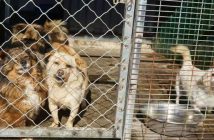 When an organic food shop opened down the street from my apartment last year, I chalked it up to a bit of wishful thinking on the part of its owner – surely someone with a little extra money and green-leaning tendencies. Soon after, I began noticing green and organic products stocked throughout many, if not most, supermarkets – and by no means limited to the more upscale chains. As it turns out, organic products have achieved a strong presence in Beijing. I just hadn’t been paying attention.
When an organic food shop opened down the street from my apartment last year, I chalked it up to a bit of wishful thinking on the part of its owner – surely someone with a little extra money and green-leaning tendencies. Soon after, I began noticing green and organic products stocked throughout many, if not most, supermarkets – and by no means limited to the more upscale chains. As it turns out, organic products have achieved a strong presence in Beijing. I just hadn’t been paying attention.
Setting the Scene
Organic has long been touted as a healthier, more environmentally responsible option when it comes to feeding our children and ourselves. Maintaining good eating habits and socially conscious lifestyles are goals most of us aspire to. As a result, buying organic has steadily risen in global popularity over the last few decades. Beijing’s own green growing practices have roots dating back to the establishment of local farms ten to 15 years ago. That modest start has seen stunning development and expansion in recent years.
Today, buying organic has become as easy as point-and-click, with numerous websites in both English and Chinese offering organic home delivery. The largest of these, Lohao City (www.lohaocity.cn), operates its own farms throughout China – located a few hours north of Beijing in Miyun county. It also distributes its produce through a chain of Lohao retail stores.
 A Personal Touch
A Personal Touch
The crux of Beijing’s organic scene, however, is the small vendors. One of Beijing’s most well reputed operations is God’s Grace Garden Plantation – often referred to as Therese’s Farm, after its founder. Beloved for its convenience almost as much as its taste, Therese’s offers fruit, vegetables, eggs and poultry through a flexible, membership-based system. An RMB 1,000 advance payment gets members weekly farm-fresh deliveries, the contents of which are selected beforehand from a seasonally varying list.
Therese’s was founded in 2001, during a time when large-scale farming was characterized by pollution and liberal pesticide use. Her farm, and others, were small and often experimental – some government-backed and others the projects of passionate individuals.
Many farms offer space for individuals and families to plant and care for their own plots, with full-time farmhands offering instruction and helping maintain the crops day-to-day. Others offer the opportunity to experience farm life without the long-term commitment. Therese’s, for example, welcomes its members to get their hands dirty for a day or two, in exchange for a box of their delicious produce.
 Life on the Farm
Life on the Farm
Farms have more to offer than just fruits and vegetables, as Ms. Lu of Agrilandia reminded me one sunny afternoon. Agrilandia, a little under an hour’s drive north of the city, is a pick-your-own-fruit-and-veggies destination with an Italian twist.Tomatoes, eggplants and corn stretch alongside numerous varieties of apples and pears imported from Europe and selected to suit Beijing’s climate. A surprisingly fancy on-site restaurant serves up a variety of Italian dishes, including delicious and relatively inexpensive pizza. Ample, often shaded resting places are scattered throughout the farm, along with a playground, small animal farm and picnic area replete with barbecue pits.
Agrilandia provides an environment for children and parents to enjoy life on the land. This is essential to Lu’s mission: She envisions her farm as a platform from which she can spread an understanding of responsible farming practices. Lu’s daughters take immense pleasure in the time they spend on the farm, and she laments that the majority of children in Beijing are completely disconnected from where their food comes from. Lu’s goal is for families to know and enjoy the farm – to become participants rather than consumers. This ethical, communal approach has characterized Beijing’s green movement from the beginning. Only recently has its message begun to enter the mainstream and become meaningful on a large scale.
Do Labels Mean Anything?
In the past, scarcity and dubious quality made it difficult to establish an organic consumer base. Farms usually sold directly to customers, who paid a steep premium for their produce. Those interested in buying organic produce also had to weigh the decision of whether to pay significantly higher prices for "organic" food at a time when those labels were highly suspect, and when the benefits of eating natural were equally unreliable.
But times have changed. A recent study funded by the European Union found that organic food generally contains more antioxidants and less fatty acids than standard produce. However, the jury is still out on whether or not organic foods are actually more nutritious. As far as taste, organic tends to win hands down. Perhaps most importantly, there is the reward of knowing that one’s food is not only safe from pollutants but also protects against environmental degradation.
Organic certification in China still lags behind the West. However, this is largely due to the complicated and expensive certification process, whether via China’s Organic Food Development Center (OFDC) or the international German-based BCS. Moreover, such certification remains suspect in many parts of Asia due to corruption among regulatory bodies. Growing in China presents a unique challenge due to extreme environmental factors beyond one’s control. Many Beijing farmers will openly admit that they can do little to guard against air pollution and runoff.
Making the Grade
Still, operators do seek certification, and this is an important trend in the establishment of consumer trust. Organic Beijing-based pork supplier Sunyoho has obtained Non-Environmental Pollution Agricultural Product certification. Though not technically organic, their pork is entirely pollution-free. The pig feed at Sunyoho is free from additives and is fermented using FA Fermentation Liquid, a patented substance developed by a Peking University Environmental biology professor. This fermentation process guarantees organic freshness while eliminating toxins and bacteria, like salmonella and E. coli. In addition, Sunyoho pigs have a long eight- to ten-month growth cycle, instead of the premature growth cycle of three months that hormone-induced pigs are subjected to.
 As a market for organic products has been identified, farmers and distributors are adapting to meet standards of quality. What farmers like Lu recognize is that in order for this positive change to continue, it is essential for younger generations to grow up with an understanding of organic culture, its benefits and its ethics. Fortunately there are many ways to share the positive qualities of natural food with your children. Personally, I recommend a stop at Wondermilk’s recently opened shop in Sanlitun Village, which offers a variety of cold and tasty natural dairy treats.
As a market for organic products has been identified, farmers and distributors are adapting to meet standards of quality. What farmers like Lu recognize is that in order for this positive change to continue, it is essential for younger generations to grow up with an understanding of organic culture, its benefits and its ethics. Fortunately there are many ways to share the positive qualities of natural food with your children. Personally, I recommend a stop at Wondermilk’s recently opened shop in Sanlitun Village, which offers a variety of cold and tasty natural dairy treats.
 Huaxia Farm, where Wondermilk is made, employs high-tech methods to ensure the happiness and health of its cows and consumers – for example, they recently invested in 20 automatic cow massagers. The result of these methods is milk free of antibiotics, hormones, and preservatives, higher in vitamins, protein, and fat. Wondermilk also offers delivery and can be found in selected supermarkets. Beyond making kid-friendly natural dairy products, Huaxia offers fun, educational and delicious group tours of its farm (which will resume next year, once the farm’s expansion is complete).
Huaxia Farm, where Wondermilk is made, employs high-tech methods to ensure the happiness and health of its cows and consumers – for example, they recently invested in 20 automatic cow massagers. The result of these methods is milk free of antibiotics, hormones, and preservatives, higher in vitamins, protein, and fat. Wondermilk also offers delivery and can be found in selected supermarkets. Beyond making kid-friendly natural dairy products, Huaxia offers fun, educational and delicious group tours of its farm (which will resume next year, once the farm’s expansion is complete).
Eating organic is not the mammoth undertaking it once was. Farms are accessible, user-friendly and many have English-speaking staff. The cost is comparable, if not cheaper, than shopping at supermarkets with boxes of vegetables starting from a mere RMB 50. With so many reasons to go organic, why not start now?
RESOURCES
Wondermilk 万得妙
Daily 10am-10pm. Sanlitun Village South, S3-13, 19 Sanlitun Lu, Chaoyang District (8721 5136) www.wondermilk.cn
朝阳区19号三里屯路三里屯南区S3-13
Agrilandia 意大利农场
Baigezhuang, Mapozhen, Shunyi District (6940 7801, 6940 7780, info@agrilandia.cn) www.agrilandia.cn
顺义区马坡镇白各庄
God’s Grace Garden Plantation
天福园有机农庄
Jiang village, Liangxiang town, Fangshan District (6033 4957, 137 0127 7398, Will2bdone@yahoo.com)
www.youjinongzhuang.com
房山区良乡江村
Lohao City 乐活城
See Directories for locations
Sunyoho 阳光悦禾
2701, Building 3, 88 Jianguo Lu, Soho Xiandaicheng, Chaoyang District. Contact Chris (131 4645 8569, sunyoho@live.cn) www.sunyoho.com
朝阳区建国路88号Soho现代城3号楼2701



